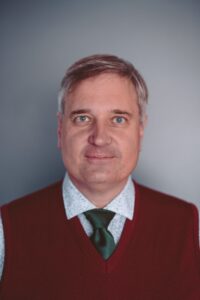
Professor Alexander Hulpke, an eminent mathematician, was recently named Chair of the Department of Mathematics at Colorado State University. With a rich academic background, including a Ph.D. in mathematics from Rheinisch-Westfälische Technische Hochschule Aachen, a German university, he has made significant contributions to both mathematical research and education.
Hulpke’s expertise is multifaceted, ranging from his integral role in developing and maintaining the Groups,Algorithms and Programming software— a principal author and maintainer since its inception —to his impactful teaching across various levels, encompassing courses in calculus, linear algebra, abstract algebra, combinatorics and number theory.’
Notably, his dedication to education is also evident in his creation of the course, “Mathematics for Computational Science,” which harmonizes mathematical foundations with conceptual calculus and features an Open Educational Resource textbook.
Beyond the classroom, Hulpke’s commitment to mathematical advancement extends to his editorial roles in prestigious journals, such as the Journal of Computational Algebra, the Journal of Symbolic Computation and Journal of Software for Algebra and Geometry.
His service to the mathematical community is also reflected in his leadership roles within the Mathematical Association of America Rocky Mountain Section, as well as his involvement in pivotal conferences and initiatives, including serving on program committees and organizing conferences. Through his diverse contributions, Hulpke has left an indelible mark on the realms of mathematical research, software development, education, and collaborative engagement.
Welcome back from the summer! How does it feel to be back at Colorado State University and in Fort Collins?
Every time I return from travel (This summer: Scotland, Belgium, Romania, Germany) I realize what a great place to live Fort Collins is. The only surprise (as someone who commutes by bike), this year was the amount of rain.
What motivated you to take on the role of department chair?
I should say to “selflessly giving back to the community,” but that would be lying. I believe strongly that strong departments should select chairs internally and being a committed faculty member, I had to put my name in the hat. I have also seen in over twenty years at CSU that some ideas for change only become real if the chair is interested. Different people have different foci, so if I wanted to realize some ideas had, I needed to run as chair.
What is your leadership philosophy and how do you plan to apply it to your role as chair?
If possible, let people do what they are trained and employed for and don’t micromanage their work. This means also to recognize and reward the various kinds of contributions of department members.
What are your top priorities and goals for the department in the coming years?
Mathematics is one of the university’s focus areas for student success. It behooves us to contribute appropriately to this important role. But we should not ignore our own major over these service needs. I want the department to revisit what a mathematics degree should be in the 21st century, and to adjust our courses, or offer new courses, accordingly.
We also are short of office space, and thus need to be more creative in how we can utilize existing space effectively.
Can you describe any specific initiatives or changes you intend to implement during your time as chair?
We should do more to serve the pool of potential students, including adults who are already working but who look for further mathematical training. Very concretely, this includes professionals who find themselves needing more mathematics for their work in industry, as well as high school teachers who need an M.S. degree to be able to teach Advanced Placement classes. Many of them are unable to attend regular in-person classes in Fort Collins of Denver due to commitments or where they live. I would like to grow our online offerings to include online M.S. degrees that serve these populations.
What do you believe are the strengths of the department, and how do you plan to build on them?
We have fantastic teachers and fantastic researchers, often both in the same person. But we are smaller than math departments at comparable universities, and thus get less noticed than we deserve. This means we need to put more effort into showcasing our work.
What also makes us special amongst mathematics departments is that many of our faculty, even in traditional areas, have research that is at the forefront of computation. We should leverage this towards expanding relevant training of students for Colorado’s growing job opportunities.
How do you plan to involve students in decision-making processes within the department?
We already have students in consultative roles on our graduate and undergraduate committees. And of course, we look and listen to feedback.
How do you plan to implement new uses of technology and ensure that the department remains competitive and relevant in a rapidly changing academic landscape?
Computers were originally designed by and for mathematicians. In this way, technology is an old hat for us. Indeed, for us, the current panic over ChatGPT simply is an echo of earlier waves about pocket calculators and Computer Algebra (such as Wolfram Alpha).
Mathematical computation has always been a core component of research and teaching in the department. What recent innovations do, however, is provide very visible applications of more modern tools from mathematics, which, for example, underlay data transmission and data security, which can only be understood with the tool set a mathematics major encounters in their junior classes.